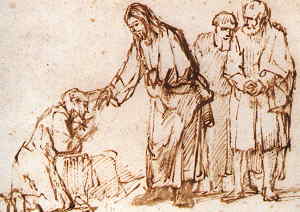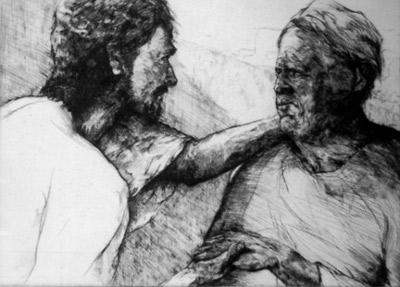Why Keep it a Secret - Healing the Leper
Every Sunday I meet with a group of high school seniors to study the Bible. It seems pretty simple on the surface but the purpose of our time together is to explore Jesus' ministry and to determine how His ministry is relevant for a young adult preparing to go off to college. We have all seen the memes and movies about college professors slapping down their Christian students. There is a popular misconception that most college campuses are hostile towards their Christian students. While I do not believe this to be the case, I do think it is my responsibility to prepare our students with the ability to articulate their faith to those who may not hold the same values or beliefs in addition to being able to articulate their faith beyond Sunday School stories and illustrated Bibles.
One of the toughest tasks for me is to anticipate the questions students will ask. The "why" questions can jump all over the place and for the most part I can anticipate them pretty well. But then there are the times when "I really don't know, I'll have to get back to you on that one" is the only answer I have. And that answer, "I don't know", is in my opinion more responsible than making something up that is total BS.
Over the coming months I am going to post up our "why" questions that I'm unsure of and try to find an answer for everyone.

Mark 1.40-45 is a healing story focusing around a socially outcast character: the leper. Lepers during this time were ritually impure and thus not welcome in Jewish society. They lived on the margins and were often on the outskirts of town. According to Leviticus 13 & 14 there are two major stipulations surrounding lepers:
- their impurity was contagious, and
- only a priest could cleanse them.
As we worked through this scene last Sunday, someone asked as we were almost out the door (I almost made it!) why did Jesus tell the man to keep his healing a secret? Why did Jesus tell the man not to tell anyone but instead tell the priest that Jesus had made the man clean?
It's a great question. We often hear that we need to shout our faith from the mountain tops. Our faith is like a light that we should not keep hidden under a bushel (see Matthew 5.16). So why then is Jesus telling this man to keep his mouth shut? Why keep it a secret?
To answer this question we must first understand the context in which Jesus was working. Jesus was not teaching in churches or performing healings among faithful believers. He was more often than not working with those on the margins of Jewish society which means that he would have been working in direct "competition" (similar to how some churches today see working with one another) with the Jewish priestly class. Jewish priests during this time oversaw and ensured that the community followed the purity codes as laid out in Leviticus 13 & 14. The priests were responsible for ensuring people were ritually clean before entering the Temple.
 Jesus' act of cleansing in this story is a direct challenge to not only priestly authority but also to the community hierarchy established by the Temple. Jesus cleansing this man is telling the former leper, the priests, along with the entire community that no longer would those who were being kept outside the community remain on the outside.
Jesus' act of cleansing in this story is a direct challenge to not only priestly authority but also to the community hierarchy established by the Temple. Jesus cleansing this man is telling the former leper, the priests, along with the entire community that no longer would those who were being kept outside the community remain on the outside.
In verse 44 Jesus says, "See that you don’t tell this to anyone. But go, show yourself to the priest and offer the sacrifices that Moses commanded for your cleansing, as a testimony to them." Rather than confronting those who were keeping this man on the fringes of society by being a witness against him the man goes public.
So there's my response. Jesus wanted the healed man to confront those who had kept him on the margins of society. A warning shot that God was doing some serious work and that this work was going to turn the entire hierarchy of the world on its head.
Now I have another question for you all, what then can we take from this? Do we proclaim to the world when the marginalized are "healed" or do we confront those who kept them on the margins?